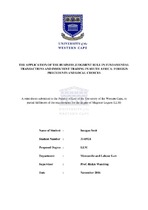The application of the business judgment rule in fundamental transactions and insolvent trading in South Africa: foreign precedents and local choices
Abstract
The so called business judgment rule (hereinafter referred to as ―the BJR or the rule‖) that serves to protect directors from liability for negative consequences of honest, reasonable business decisions that went wrong, was developed by the American judiciary in the early 19th Century.2 Percy v. Millaudon, a Louisiana Supreme Court decision quoted above, articulated what is now referred to as the BJR.3 This case provides the earliest expression of the American BJR.4 Delaware courts subsequently issued a series of cases formulating the BJR as a presumption.5 Although the earliest expression of the rule was provided by a Louisiana court, the dissertation will focus on the Delaware case law formulation of the rule.6 The essence of the BJR is that judges should not second guess directors‘ decisions if certain elements of the BJR are fulfilled.7 Courts are required to exercise caution when dealing with claims brought by either stakeholders or shareholders against directors who have made bona fide, also referred to as good faith, business decisions.8 In order to be protected by the BJR and for it to act as a safe harbour, the court will determine whether certain requirements have been met before applying the rule.9 The Delaware courts formulated the BJR as a presumption and in order for directors to be protected by the rule they must have made an informed business decision, in good faith and in the honest belief that the decision will be in the best interest of the company.10 As will be discussed later, this formulation of the rule is referred to as the traditional BJR. In addition to the aforementioned formulation, another formulation was provided by the American Law Institute (hereafter referred to as the ―ALI formulation‖).11 Initially there had been difficulties codifying the ALI version of the rule but later it was successfully codified in paragraph 4.01(c) of the ALI Corporate Governance Project.12 This formulation requires a director to ensure that he has no personal interest in the matter, he is reasonably informed of the matter prior to making the decision and he rationally believes the decision will be in the best interest of the company.13 If the director complies with the aforementioned requirements, the director will be considered to have acted in good faith.14 Directors owe fiduciary duties to the company and in instances where they breach one or more of these duties they can incur personal liability.15 The rule thus emerged because of the need to protect directors and it serves as a safe harbour for those individuals who made a decision in conformity with the aforementioned requirements.16 In commercial terms the rule bestows economic freedoms and freedom of entrepreneurship to directors guided, in any case, by ―the best interest of the company‖.17 The most commonly cited reasons for the existence of the rule are that it promotes risk taking, encourages competent persons to serve as directors, prevents judicial second-guessing and promotes judicial efficiency. It further provides directors with sufficient freedom to manage the company and it ensures that the interest of shareholders and those of directors are balanced.18

